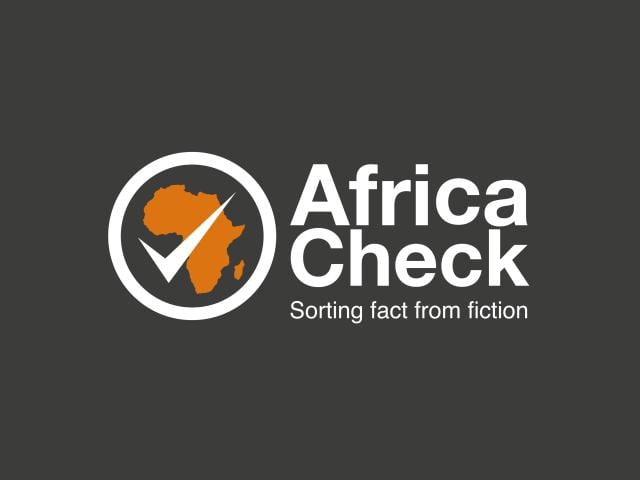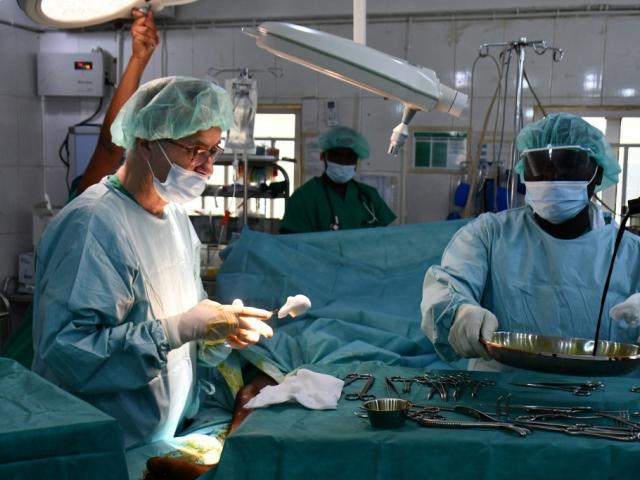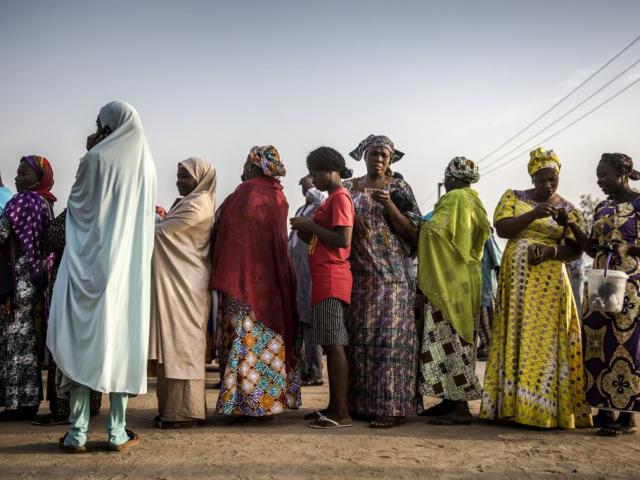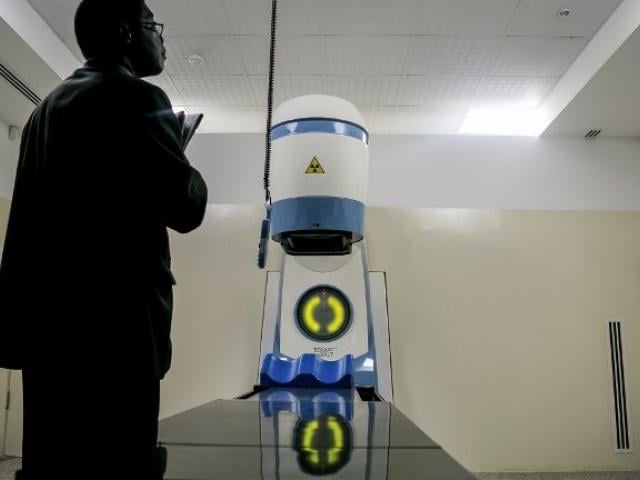-
Alausa was right that the 2024 health budget was the largest in the last decade in gross figures. But as a proportion of the overall budget, it's not.
-
His assertion that the health budget was more than 5% of the total budget was incorrect – it was 4.66%.
-
The minister was on track in claiming that the HPV vaccine is more than 70% effective against cancer, but his figures on how many girls have been vaccinated do not add up.
In February 2024, while using artificial intelligence tools to monitor public debate, Africa Check spotted a news article claiming that president Bola Tinubu had delivered “the largest healthcare budget in Nigeria’s history”.
This claim was attributed to the minister of state for health and social welfare, Dr Tunji Alausa.
The article did not include a source, but Africa Check unearthed an interview that Alausa gave to Arise TV News that same month. Here the minister made similar claims about record health spending and mass vaccination, and presented these as evidence of Tinubu's renewed focus on health since taking office in May 2023.
Alausa, a nephrologist, founded the Kidney Care Centre and the Dialysis Care Centre in the US before Tinubu appointed him minister.
We verified four claims from the interview.
Alausa said Nigeria's 2024 budget allocated more money to health than any other in the past decade.
The country allocated N1.34 trillion (about US$1.78 billion) to the health sector in 2024. This is the highest allocation since 2014 and in gross terms supports the minister's claim as stated.
But the claim needs context.
As Nigeria's total budget has increased every year over the period the minister was looking at, it is helpful to look at proportions.
In 2024, the share of the total budget allocated to health is 4.66%. In the last decade, this proportion was reached or exceeded in at least three other years – 2014, 2015 and 2023.
In addition, Nigeria often bases its budget on the price at which it expects to sell its main foreign exchange earner, crude oil.
Nnodimele Atulomah, a professor of public health at the School of Public and Related Health at Babcock University in Ogun state, western Nigeria, told Africa Check that the fluctuating exchange rates affect the actual value of the allocations.
At the official exchange rates used as a benchmark for the budget, the country's highest allocation to health was $2.47 billion (N1.08 trillion) in 2023, under Buhari’s predecessor Muhammadu Buhari.
This is followed by the 2024 allocation of $1.78 billion (N1.34 trillion), which is comparatively lower than the previous year.
Nigeria continues to struggle to pay for healthcare
In developing and low-income countries like Nigeria, the current size of the health budget is unlikely to promote universal health coverage (UHC). This is according to Nnodimele Atulomah, a professor of public health at the School of Public and Related Health at Babcock University in Ogun state, western Nigeria.
UHC aims to ensure that everyone has access to the health services they need without struggling to pay for them. Without this, citizens who need health services have to pay out of pocket, making them poorer, Atulomah told Africa Check.
Achieving universal health coverage by 2030 was one of the global targets set by countries in 2015, when the United Nations’ Sustainable Development Goals were adopted.
The health budget also does little to improve the plight of health workers, Atulomah said, citing the number of Nigerian medics leaving for better opportunities abroad, while facilities are also under-resourced.
“Doctors and health workers are underpaid and lack adequate equipment, leading to poor service delivery,” he said.
The National Health Insurance Scheme, under the federal ministry of health, requires that all Nigerians be provided with accessible and affordable health services. It also regulates private health insurance schemes in the country.
The scheme includes a compulsory 5% deduction from an employee's basic monthly salary, while employers are required to contribute 10%.
Atulomah said part of the problem was that Nigerians “do not trust the system, expect freebies and are unwilling to pay the statutory 5% National Health Insurance Scheme contributions”.
He said the health system could have been better funded if more people contributed.
In 2001, African countries pledged to spend 15% of their annual budgets on health, in what is known as the Abuja Declaration. Atulomah said this would help solve Nigeria's health problems “unless there is no accountability and funds are misappropriated”.
Alausa went on to say that more than 5% of the 2024 budget has been allocated to healthcare, in line with the administration's stated commitment to improving the sector.
In July 2023, Tinubu's special adviser on health, Salmas Anas, outlined the president's plans at a health summit in Abuja, the country’s capital.
According to Anas, the president would “start with 10% of the total budget allocation [going] to health and that is just the beginning”.
But the reality is somewhat different. Out of a total budget of N28.77 trillion ($38.37 billion) for 2024, only N1.34 trillion ($1.78 billion) was allocated to health, or 4.66% of the budget.
This share is in line with the pattern of the last decade, where health allocations have ranged from 2.7% in 2022 to 5.3% in 2015, according to data from the federal budget office.
Nigeria has consistently missed the target of allocating 15% of its annual budget to health, as agreed in the 2001 Abuja Declaration.
Human papillomavirus (HPV) is a common sexually transmitted infection that can affect the skin, genitals and throat. Persistent HPV infection can lead to a variety of cancers, including cervical, anal, penile and oral cancers.
According to the World Health Organization (WHO), vaccination against HPV is an important preventive measure.
In an attempt to show the importance of the HPV vaccine, Alausa said it had a cancer prevention rate of over 70%. However, he did not specify whether he was referring to all cancers or just cervical cancer.
The WHO says that cervical cancer is “by far” the most common HPV-related disease. In Nigeria, cervical cancer is the second most common cancer in women, after breast cancer.
Vaccine effectiveness is a measure of how well vaccines work in the real world. The WHO licensed the first HPV vaccine in 2006. There are now six types of vaccines licensed for use, all of which are safe.
According to the US Centers for Disease Control and Prevention, the “HPV vaccine has the potential to prevent more than 90% of HPV-attributable cancers”.
The US National Cancer Institute also says the HPV vaccine is “estimated to prevent up to 90% of cancers caused by HPV infection and genital warts”.
Alausa’s claim of over 70% effectiveness is a significant understatement, but his claim is generally correct.
In Nigeria, cervical cancer is the second most common cancer among women, after breast cancer. This is according to 2023 data from the HPV Information Centre, a project of the International Agency for Research on Cancer, a WHO unit, and the Catalan Institute of Oncology in Spain.
Cervical cancer is treatable when detected early and can be prevented by vaccination. But many women are not aware of the importance of screening, which means that cervical cancer is often diagnosed at a late stage when treatment is very limited and mortality rates increase.
“Being vaccinated at age 9–14 years is a very effective way to prevent HPV infection, cervical cancer and other HPV-related cancers,” the WHO says.
The HPV Information Centre says 60.9 million Nigerian women are at risk of cervical cancer. There are an estimated 12,075 cases in Nigerian women each year and 7,968 deaths annually.
To prevent more deaths from cervical cancer, Nigeria’s health ministry launched the HPV vaccination programme. This aims to vaccinate 7.7 million girls in two phases.
Alausa claimed that this had already been done.
The first phase was a five-day mass vaccination campaign which started on 24 October 2023. It was made part of the routine immunisation schedules and vaccinated girls aged 9 to 14 in schools and homes.
The second phase of the vaccination programme will begin in May 2024.
Media reports quoted the director of the National Primary Health Care Development Agency, Muyi Aina, as saying that 4.7 million girls in 16 states and the capital had been vaccinated in the first phase.
We have contacted the agency by email, phone and text to ask if the figures had changed, but have not received a response. We will update this report when we hear back.
Based on the publicly available data, Alausa’s claim that 7.7 million girls have already been vaccinated is incorrect.










Add new comment